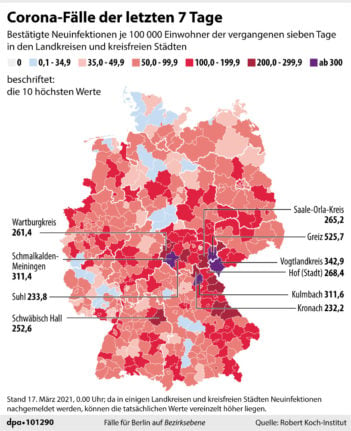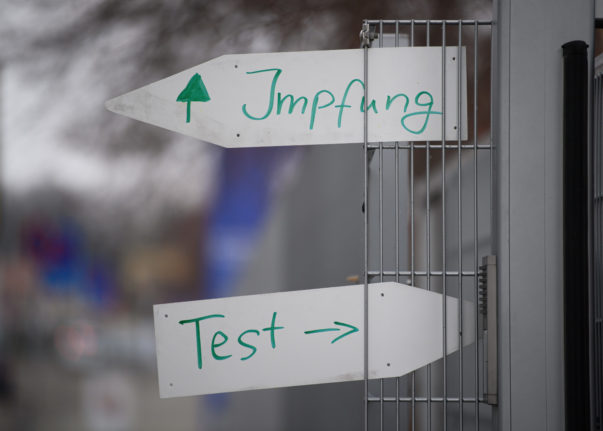The more contagious B.1.1.7 variant originally detected in the UK now accounts for 72 percent of all cases in Germany, according to the Robert Koch Institute (RKI) on Thursday.
Last week, the RKI was still talking about a B.1.1.7 share of about 55 percent. At the beginning of the RKI survey about one and a half months ago, the share of the mutant stood at only about six percent.
A rapid increase in Germany had been feared following similar experiences in other countries, including the UK, South Africa, Czech Republic and Slovakia.
Due to the now high proportion of B.1.1.7, an exponential increase in the number of coronavirus cases in Germany is to be expected, said the RKI earlier this week. They predicted that by Easter, numbers would be higher than they were around Christmas, when Germany first introduced a harder shutdown.
READ ALSO: German coronavirus cases ‘will be higher at Easter than before Christmas’
What are the current Covid-19 numbers?
The number of new infections as of Thursday (17,504) is 3,000 higher than a week ago, reported the RKI. However, the number of deaths from or with the coronavirus stood at 272, down from 321 a week ago.
The 7-day incidence of new infections per 100,000 residents grew to 90 as of Thursday, up from 86.2 on Wednesday, and 69.1 exactly a week before. The incidence rate marks the highest level since February 2nd.
Since the beginning of the pandemic, German health authorities have counted 2,612,268 coronavirus infections, and a total of 74,132 deaths from or with the virus.

Could Germany introduce a new vaccine?
After the temporary halt of AstraZeneca jabs on Monday, more German politicians are promoting the Russian vaccine Sputnik V in order to more quickly vaccinate the population.
Earlier this year, German Chancellor Angela Merkel promised every resident a vaccine by September, but a slow start to the vaccine campaign and fears over whether the widespread AstraZeneca jab could cause blood clots has cast doubt on the speed of the roll out.
READ ALSO: Germany suspends AstraZeneca vaccine over blood clot concerns
“The (Sputnik V) vaccine should be approved. Russia is a great country of science, and I have not the slightest doubt that the science there is capable of producing a powerful vaccine,” Saxony’s state premier Michael Kretschmer (CDU) told the newspapers of the Funke-Mediengruppe on Thursday.
Like Kretschmer, Saxony-Anhalt’s state premier Reiner Haseloff (CDU) pointed out that the European Medicines Agency (EMA) would first have to decide on the approval.
“Basically, however, the following applies: in the fight against coronavirus, we welcome any vaccine that is safe and effective and thus helps us to overcome the pandemic,” he told the Funke-Zeitung.
“When it comes to people’s health, origin should not play a role.”
Thuringia’s state premier Bodo Ramelow (Left Party) told the Funke-Blättern: “For a long time, I’ve been wishing for much more pressure from the federal government to get more alternative vaccines approved.”
The EMA was set to release its decision on AstraZeneca Thursday afternoon at 4 pm.
READ ALSO: German vaccine boss praises Russian vaccine as ‘clever’



 Please whitelist us to continue reading.
Please whitelist us to continue reading.
Member comments